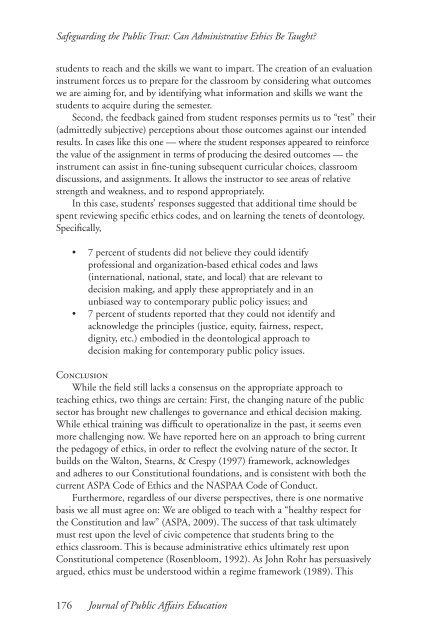JOURNAL OF PUBLIC AFFAIRS EDUCATION - Naspaa
JOURNAL OF PUBLIC AFFAIRS EDUCATION - Naspaa
JOURNAL OF PUBLIC AFFAIRS EDUCATION - Naspaa
Create successful ePaper yourself
Turn your PDF publications into a flip-book with our unique Google optimized e-Paper software.
Safeguarding the Public Trust: Can Administrative Ethics Be Taught?students to reach and the skills we want to impart. The creation of an evaluationinstrument forces us to prepare for the classroom by considering what outcomeswe are aiming for, and by identifying what information and skills we want thestudents to acquire during the semester.Second, the feedback gained from student responses permits us to “test” their(admittedly subjective) perceptions about those outcomes against our intendedresults. In cases like this one — where the student responses appeared to reinforcethe value of the assignment in terms of producing the desired outcomes — theinstrument can assist in fine-tuning subsequent curricular choices, classroomdiscussions, and assignments. It allows the instructor to see areas of relativestrength and weakness, and to respond appropriately.In this case, students’ responses suggested that additional time should bespent reviewing specific ethics codes, and on learning the tenets of deontology.Specifically,• 7 percent of students did not believe they could identifyprofessional and organization-based ethical codes and laws(international, national, state, and local) that are relevant todecision making, and apply these appropriately and in anunbiased way to contemporary public policy issues; and• 7 percent of students reported that they could not identify andacknowledge the principles (justice, equity, fairness, respect,dignity, etc.) embodied in the deontological approach todecision making for contemporary public policy issues.ConclusionWhile the field still lacks a consensus on the appropriate approach toteaching ethics, two things are certain: First, the changing nature of the publicsector has brought new challenges to governance and ethical decision making.While ethical training was difficult to operationalize in the past, it seems evenmore challenging now. We have reported here on an approach to bring currentthe pedagogy of ethics, in order to reflect the evolving nature of the sector. Itbuilds on the Walton, Stearns, & Crespy (1997) framework, acknowledgesand adheres to our Constitutional foundations, and is consistent with both thecurrent ASPA Code of Ethics and the NASPAA Code of Conduct.Furthermore, regardless of our diverse perspectives, there is one normativebasis we all must agree on: We are obliged to teach with a “healthy respect forthe Constitution and law” (ASPA, 2009). The success of that task ultimatelymust rest upon the level of civic competence that students bring to theethics classroom. This is because administrative ethics ultimately rest uponConstitutional competence (Rosenbloom, 1992). As John Rohr has persuasivelyargued, ethics must be understood within a regime framework (1989). This176 Journal of Public Affairs Education
















